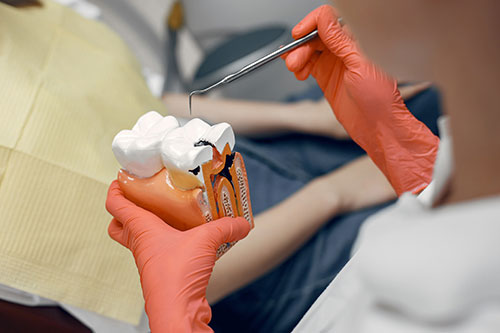Toothwise Wisdom

- Tooth enamel is the hardest part of our body, stronger than bone.
- Humans have 2 sets of teeth, primary – 20 +, permanent – 32.
- An adult has 4 different types of teeth namely incisors, canines, premolars and molars.
- Your teeth are uniquely yours like fingerprints.
- Dental caries is one of the most common diseases of the human body.
- Teeth are like icebergs, 2/3rd of each tooth is buried under the gums.
- Teeth have 200 lb. of bite force.
- Teeth start developing much before a baby is born.
- Rarely, some babies are born with teeth.
- Teeth play a major role in oral/ first phase of digestion.
- Stress can lead to clenching or grinding of teeth, which can also attrite the tooth enamel, causing cracks and sensitivity.
- Healthy gums are firm and coral pink in colour.
- Red, swollen gums, gum bleeding and bad breath are signs of gum diseases.
- A common oral finding during pregnancy is gum inflammation and bleeding called pregnancy gingivitis, which usually settles post-partum.
- Skin diseases and many autoimmune disease can manifest itself on the gums.
- Gum disease if left untreated, may affect the tissues and bone surrounding the tooth, making the tooth mobile resulting in loss of tooth.
- Early detection and treatment of gum problems followed by regular maintenance ensures healthy gums and teeth.
- Saliva has got the enzyme ptyalin which helps in carbohydrate metabolism (breaking down sugar).
- Saliva acts as a lubricant and makes swallowing easier.
- Saliva is the primary defence mechanism against oral bacteria.
- 3 major salivary glands and multiple minor salivary glands are present in the oral cavity.
- Daily salivary secretion is around 1-1.5 litres.
- The hormone-related changes during menopause also affect the oral cavity and have an impact on the salivary secretion.
- Our sense of taste needs saliva to work. We cannot taste the food unless it is mixed with saliva.
- The tongue contains between 2000-3000 taste-buds.
- Taste-buds contain chemoreceptors that respond to chemicals from food and other substances that are dissolved by saliva in the mouth.
- Sublingual route (below the tongue) is one of the fastest and easiest modes of drug administration.
- Smiles use from 5 to 53 facial muscles. Just smiling can require your body to use up to 53 muscles, but some smiles only use 5 muscle movements.
- Key to good oral hygiene – brush 2 times a day for 2 minutes.
- Excessive brushing can also cause abrasion of the enamel causing sensitivity.
- The ideal brushing technique to be followed varies with age, based on the dentition.
- The mouth is the gateway to the human body. Healthy mouth = healthy you.

Dr. U. Rakesh
Consultant Dental Surgeon
Kauvery Hospital, Chennai

